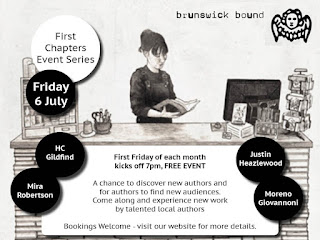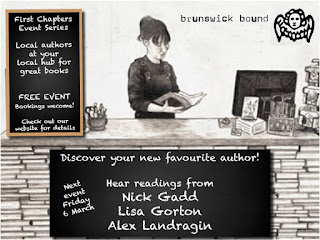First Chapters Q&A with Julia Prendergast
"Julia Prendergast is a real writer who writes about real life". Bruce Pascoe
Julia Prendergast has a PhD in Writing and Literature and is a lecturer in Writing and Literature at Swinburne University in Melbourne.
Julia will be reading at First Chapters on Friday 3 August from her novel The Earth Does Not Get Fat.
We asked Julia some general bookish questions to get to know her better.
Julia Prendergast has a PhD in Writing and Literature and is a lecturer in Writing and Literature at Swinburne University in Melbourne.
Julia will be reading at First Chapters on Friday 3 August from her novel The Earth Does Not Get Fat.
We asked Julia some general bookish questions to get to know her better.
1. Brunswick Bound has asked you
to read a chapter from your published work. Tell us what we can expect
from the chapter you have chosen?
‘Sowing the Wind’ is the first
chapter I wrote towards The Earth DoesNot Get Fat. This chapter appears towards the end of the novel. The
characters in this story would not leave me alone and so it became a novel in
stories. Many chapters, including this one, are published as standalone short
stories. The novel is a fractured narrative, in multiple first person voices.
The setting of the chapter is
the seaside—Mornington Peninsula foreshore. Annie’s children go missing at the
beach.
2. How would you describe the
kind of books that you write?
It sounds like the simplest question but I’m not sure it is.
Perhaps… dirty realism. I like ‘behind closed doors’ stories.
Arnold Zable says the book is: Poetic,
yet earthed, driven by a raw intensity. I hope that’s true.
3. What was the first book that
you read (or had read to you) that left an impression on you?
I’m not sure about the first… The
most recent books I’ve read, that really floored me, are works by Sofie Laguna
and Josephine Rowe. They kill it.
I think there is a lot of
disagreement about what the big questions are.... Personally, I’m interested in
stories about how we love and live, in diverse ways. I think books offer a way
of seeing through the eyes of an other—for
engaging, experientially, with the world of others.
For me that’s the gift and power of narrative—to offer alternative ways of seeing and knowing and to offer
questions, rather than answers.
5. What’s your go-to solution
for writer’s block?
Read.
6. What is your favourite word or phrase?
I like unusual word
combinations. I read a review recently—of a book about teaching creative
writing. The review referred to our ideas as our ‘belief salad’. I like that.
7. What do you put down as your
occupation when asked?
Writer. Academic.
8. What is the question that you
hope never to be asked in an author Q&A?
I’m happy to be asked anything.
I’m not sure I’d answer everything but I’m happy to be asked…
9. What question do you hope you
will be asked?
Would you like a glass of wine? (BB: You will certainly be asked that)
10. Which book that you have
read do you think should be better known or more widely read?
I just read a collection of
short fiction by Irish writer Alan McMonagle: Psychotic Episodes. It is gritty, thoughtful, tender, full of
yearning, and funny in unexpected places.





Comments
Post a Comment